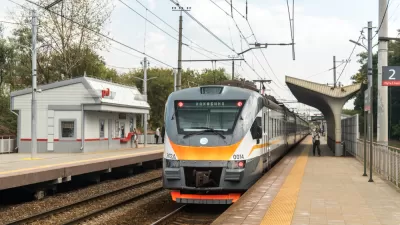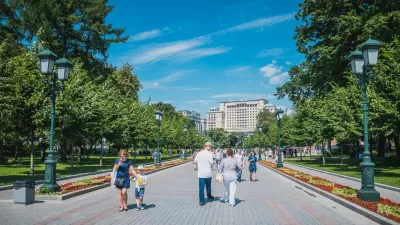Russia's growing middle class is leading a boom in American-style enclosed shopping malls, which are still rather new to the country. Some rival the size and popularity of Minnesota's infamous Mall of America.
At the same time that commentators in America are proclaiming the coming death of the shopping mall and the return of inner city retail, Russia has caught a case of mall mania, driven by an emerging middle class with disposable income and salavating and Wall Street banks, reports Andrew E. Kramer. "As American malls dodder into old age, gaptoothed with vacancies, Russia’s shopping centers are just now blossoming into their boom years, nourished by oil exports that are lifting wages."
“'It’s 1982 all over again in Russia,' said Lee Timmins, the country representative of Hines, a Texas-based real estate group that is opening three outlet malls in Russia, referring to the heyday of the American mall experience. Russians, he said, love malls."
And the country isn't wading slowly into mall development, it's diving in head first. With 34 million square feet, Moscow "has more floor space in malls than any other European city." Most astoundingly, this development has only occured over the last dozen years. As Kraner notes, "the first Western-style suburban mall opened in 2000."
“'Over the past 10 years, Russia has turned into a middle-class country,' Charles Slater, a retail analyst at Cushman & Wakefield, a commercial real estate consulting firm, said in an interview. 'What better to do than go to an enclosed, warm environment with many things on offer, whether that be bowling, cinema or food courts, things the customers have not been used to in the past?'”
FULL STORY: Malls Blossom in Russia, With a Middle Class

Alabama: Trump Terminates Settlements for Black Communities Harmed By Raw Sewage
Trump deemed the landmark civil rights agreement “illegal DEI and environmental justice policy.”

Planetizen Federal Action Tracker
A weekly monitor of how Trump’s orders and actions are impacting planners and planning in America.

The 120 Year Old Tiny Home Villages That Sheltered San Francisco’s Earthquake Refugees
More than a century ago, San Francisco mobilized to house thousands of residents displaced by the 1906 earthquake. Could their strategy offer a model for the present?

Congestion Pricing Drops Holland Tunnel Delays by 65 Percent
New York City’s contentious tolling program has yielded improved traffic and roughly $100 million in revenue for the MTA.

In Both Crashes and Crime, Public Transportation is Far Safer than Driving
Contrary to popular assumptions, public transportation has far lower crash and crime rates than automobile travel. For safer communities, improve and encourage transit travel.

Report: Zoning Reforms Should Complement Nashville’s Ambitious Transit Plan
Without reform, restrictive zoning codes will limit the impact of the city’s planned transit expansion and could exclude some of the residents who depend on transit the most.
Urban Design for Planners 1: Software Tools
This six-course series explores essential urban design concepts using open source software and equips planners with the tools they need to participate fully in the urban design process.
Planning for Universal Design
Learn the tools for implementing Universal Design in planning regulations.
Clanton & Associates, Inc.
Jessamine County Fiscal Court
Institute for Housing and Urban Development Studies (IHS)
City of Grandview
Harvard GSD Executive Education
Toledo-Lucas County Plan Commissions
Salt Lake City
NYU Wagner Graduate School of Public Service





























